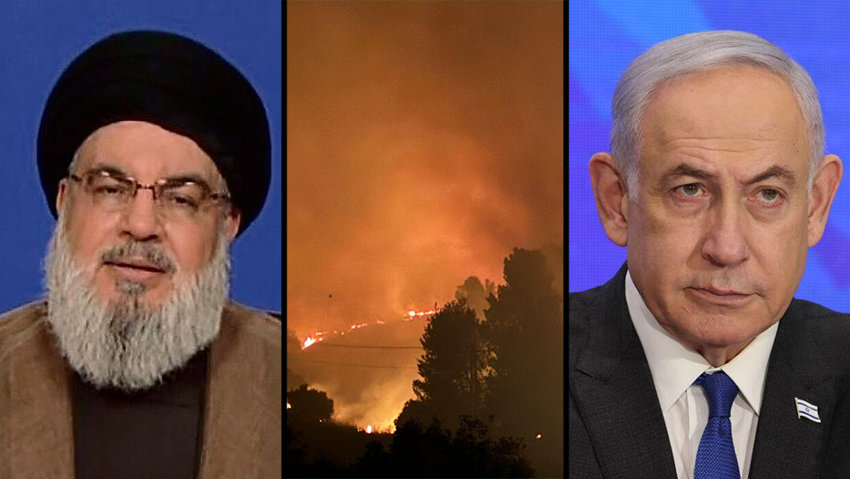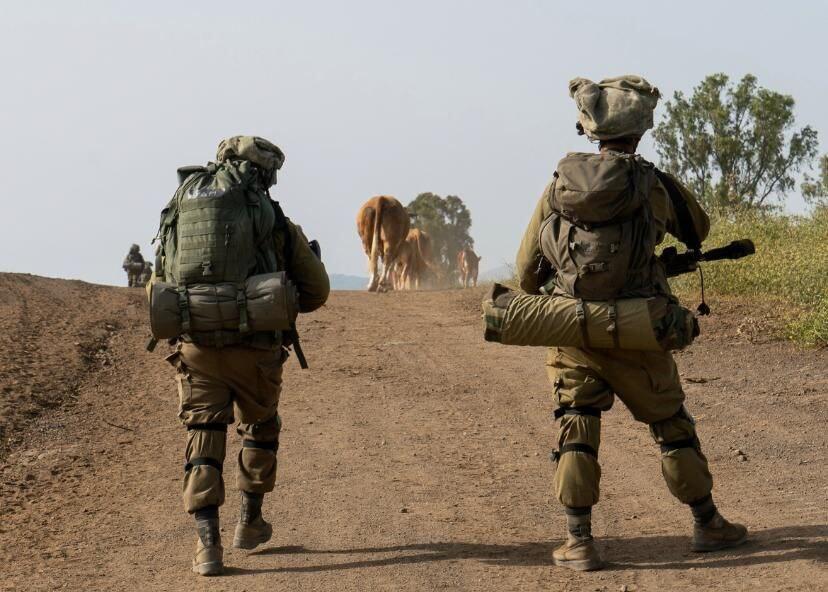Israel must dramatically rethink its strategic approach to managing the war: no longer should the north be a defensive front; instead, it should become the primary battlefield. Are we facing a historic opportunity to reshape the security landscape against Hezbollah for generations to come? Let me explain why I believe so.
On August 25, Israel launched a preemptive airstrike on Hezbollah, yet we remain on the defensive. Since October 7, Israel has adopted a strategic approach focused on an offensive in Gaza while maintaining a defensive posture on other fronts.
2 View gallery


Hezbollah leader Hassan Nasrallah; Prime Minister Benjamin Netanyahu
(Photo: Alex Kolomoisky)
This reality emerged despite the longstanding belief in the corridors of Israel's defense establishment that the northern border represents the main front. However, the surprise attack by Hamas, along with various constraints (such as limited forces and ammunition shortages), led to a shift in priorities, resulting in a "Gaza First" approach.
This situation has created uncertainty for Israel's northern residents. Unlike those in the south, many of whom have returned home and see light at the end of the tunnel, many northern residents were evacuated with no return date in sight. They now watch from afar as their homes and communities are systematically destroyed.
The north is economically paralyzed, and the displaced are forced to start the upcoming school year in temporary and improvised settings, a situation many find intolerable. While many residents are determined to return home in the future, some have already lost hope.
In numerous conversations with northern residents, I've heard a clear message: they refuse to return to a reality where "Nukhba-like terrorists on steroids" like Hezbollah's elite "Radwan Unit" sit on their borders, capable of committing atrocities similar to those seen on October 7 in Gaza border towns.
To create a reality where northern residents can safely return to their homes, there are theoretically two options:
- A diplomatic solution that would see Hezbollah withdraw north of the Litani River: This option seems unlikely at the moment, especially given the lack of significant international pressure on Iran and Hezbollah. Furthermore, there are no clear mechanisms to enforce such a withdrawal that would prevent Hezbollah from returning to southern Lebanon. Additionally, all discussions between special U.S. envoy Amos Hochstein and Lebanon have so far been fruitless, focusing instead on territorial concessions demanded by Hezbollah from Israel.
- A military solution: In the absence of a diplomatic resolution, the realistic option is a military one. This would require setting war objectives, the foremost being: creating the conditions for the safe and long-term return of northern residents to their homes. Achieving this would necessitate the destruction of Hezbollah in southern Lebanon and the establishment of a security zone, neutralizing the organization's capabilities.
Is this achievable? Absolutely. Unlike the situation we face in Gaza, the IDF enjoys complete intelligence superiority in the north. This superiority has been demonstrated over the past ten months with the elimination of dozens, if not hundreds, of senior commanders and operatives in Hezbollah and other organizations, including the assassination of Hezbollah military chief Fuad Shukr. On Sunday morning, the IDF showcased its intelligence and operational dominance by intercepting missile and drone attacks on central Israel.
Being on the defensive is not an ideal state, especially for a country with limited strategic depth. While the decision to maintain a defensive posture on other fronts was correct over the past ten months, a new reality has emerged. In this reality, the Gaza front is on the verge of being resolved. If the trend in the south continues, Hamas will be completely destroyed as a fighting force in the Gaza Strip.
 Amir AviviPhoto: DANIEL 'STRAVO
Amir AviviPhoto: DANIEL 'STRAVOIts weapons production infrastructure has already been obliterated, the supply line from Egypt through the Philadelphi Corridor has been cut off, and northern Gaza is sealed off by IDF forces. The civilian population has by now evacuated most of the Gaza Strip, and the IDF is eliminating Hamas at a rate of 50 terrorists per day. Hamas' expiration date is very near.
There is no connection between the hostage deal and the strategic considerations regarding our forces' activities on the northern border. While Iran and Hezbollah are trying to link the two issues, claiming that a cease-fire in the south would lead to a similar cease-fire in the north, this serves the enemy's interests, not Israel's. Israel's interest lies in removing the threat from the northern border, not in achieving a cease-fire under Hezbollah's terms, which would allow it to continue sitting on the fences of Israeli border communities like Metula and Hanita.
Now that the Hamas threat in the south is almost neutralized, the time has come to fundamentally change our strategic approach, namely: defining Gaza as a secondary front and establishing the north as the primary one. This is the only significant decision the Cabinet must make now.
The shift from defense to offense in the north is essential not only because we wish to create the conditions for Israeli residents to return home. It is also necessary if we ever want to regain the initiative. Israel must learn from experience and understand: we must choose between a Six-Day War scenario and a Yom Kippur War scenario. If we do not take the initiative, we will be surprised and pay in blood, for what's here today, is gone tomorrow.
- Brigadier General (res.) Amir Avivi is the founder and chairman of the Israel Defense And Security Forum (IDSF).



